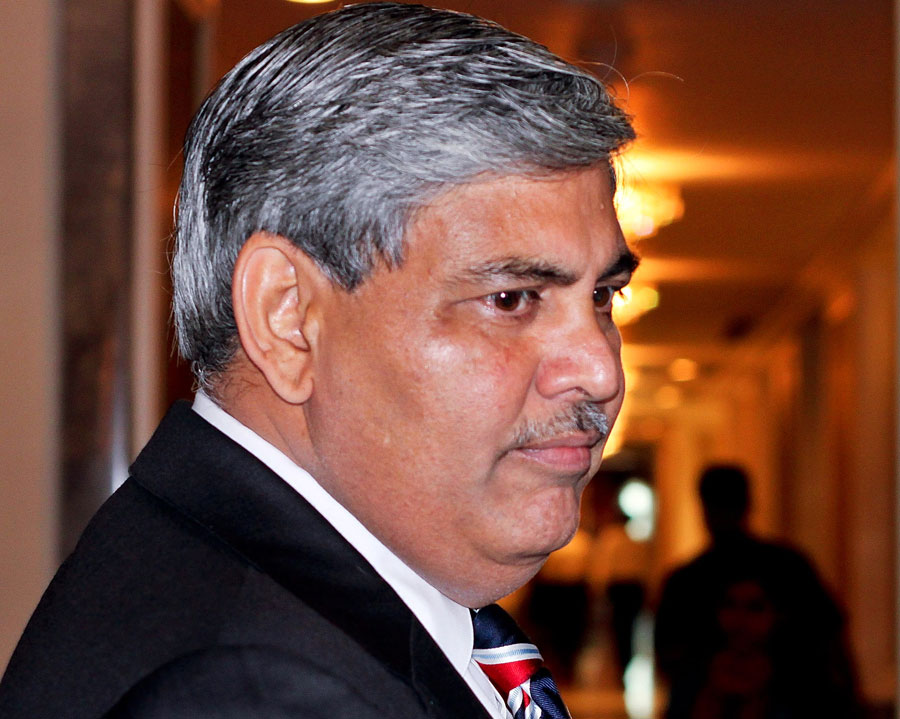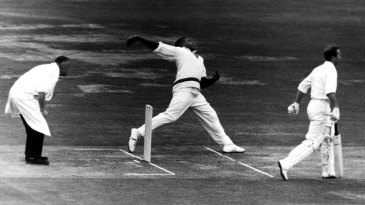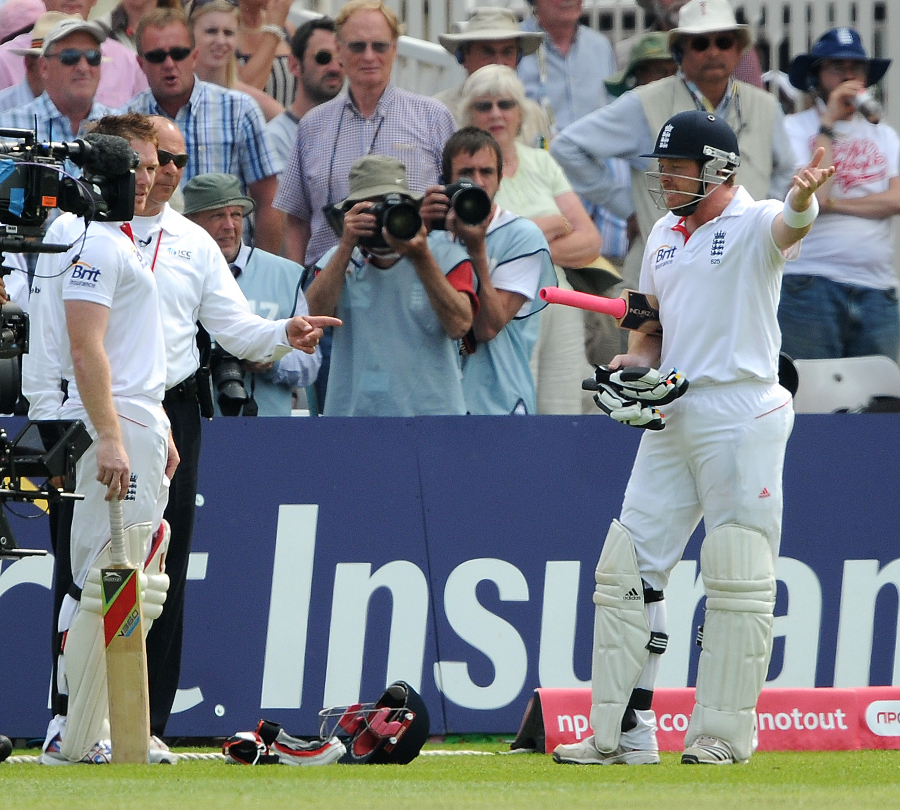ROB STEEN in Cricinfo
 By putting a stop to the brief reign of the Big Three, Shashank Manohar has managed to do something that defied criticism © Getty Images
By putting a stop to the brief reign of the Big Three, Shashank Manohar has managed to do something that defied criticism © Getty ImagesI simply couldn't believe all the filth which came out of their mouths. All day long. And to anyone. It was hilarious but unrepeatable, and because I wanted them to treat me as one of the lads, I accepted it.
You really know how to control a match buddy. It's a f***ing joke.
Two snapshots of sport in 2016, both from Australia, the nation that, some might say, put the "tit" in competitive.
That first reverberant sound bite emerged last week from England wicketkeeper Sarah Taylor, semi-fondly reminiscing about her recent experiences as the first woman to play the highest grade of male club cricket for Northern Districts in Adelaide. Somewhat unsurprisingly, she discovered that her ears and sensibilities were not going to be spared. As Bryan Ferry so eloquently put it, "Boys will be boys will be boys-yoy-yoys…"
The second, decidedly unsound bite came during last month's Australian Open, when that gifted but very naughty overhead smasher Nick Kyrgios hit fresh heights in his impressive assault on John McEnroe's all-time record for sporting officials harangued, abused and ridiculed. Indeed, at the end of the match in question, Kyrgios approached James Keothavong, the latest object of his loathing, and told the British umpire he was "a terrible referee", thus achieving the notable double of being at once searingly honest and hopelessly wrong.
What distinguishes the verbals encountered by Taylor from those delivered by Kyrgios, of course, is that the former occurred during a match that was not covered by the all-seeing, almost-all-hearing broadcasters. What further unites them is that the rules of the respective games, at amateur and professional level alike, empower the enforcers to penalise the offensive offenders. It is in the now-histrionic court of public approval that things get messy.
Naturally, there are those - almost invariably the sort of folk who claim to have first-hand memories of the '60s but were already too old to join in the fun - who will assure you that bad behaviour during a sporting contest is a strictly late-20th-century curse, triggered by the advent of unseemly rewards and the TV-fuelled obsession with personalities and controversy. This is, of course, absolute rot.
For no justifiable reason, playing sport for a living - unlike acting or singing or dancing or painting - means not only having to behave yourself, but being seen to behave yourself.
Ask Colin McDonald. Roused by Mike Atherton's recent contention that Fred Trueman and Brian Statham were England's No. 1 all-time co-manipulators of the new cherry, the dogged former Australia opener recently reflected on the might of Frank "Typhoon" Tyson: "I will never forget the remarks made by my opening partner Jim Burke during the 1959 Adelaide Test after a Tyson bouncer: 'If you bowl another one of those I'll knock your block off with this bat.' 'Will yer?' replied Frank. Not wishing to enjoy being the recipient of a similar delivery, my pleasant rejoinder to Tyson on his way back to his mark was 'Well bowled.'"
In emailing those wincing reminiscences to the Times, McDonald perhaps unwittingly highlighted the preposterousness of what might best be termed the sporting contract - that timeless unwritten constitution that obliges professional sportsfolk to seek victory at any cost but behave like a pre-pubescent Mormon; the same unwritten constitution that simultaneously obliges our competitive artists to remember, above all, that it's only a blimmin' game.
For those who regard ungentlemanly conduct as perpetually indefensible, last week's Under-19 World Cup game between West Indies and Zimbabwe in Chittagong proffered much to get high and mighty about. With one over remaining and the Zimbabweans requiring a further three runs, Richard Ngarava was "mankaded" by Keemo Paul, sending waves of disgust rippling around the planet.
Indeed, it says all too much about cricket's self-deluding self-image that a photograph of the incident made its way onto the English sports pages even though not one of Blighty's nine national daily papers sent a correspondent to the tournament - thus missing the lethally precocious magnificence of Alzarri Shaheim Joseph, a skyscraping Antiguan beanpole who seems destined to put Kemar Roach and Jerome Taylor to shame by becoming the millennium's first great lean, mean Caribbean pace machine.
In principle, this column agrees wholeheartedly with Tony Cozier: the notion of being honour-bound to deliver a pre-emptive warning is more than a little stupefying. For one thing, it's not as if we expect batsmen to stick their hand up and inform the bowler they're about to suddenly take guard the other way round. For another, baseball, cricket's uppity younger brother, has always been more clear-cut: if a runner is caught straying off base while sneakily seeking a head start, he's out and that's it. No ethical posturing or accusations of moral bankruptcy here. In fact, such dismissals are so common they have their own incriminating name: "picked off".
 If Ched Evans wins his appeal and is re-signed by Sheffield United, will he be greeted with apologies? © Getty Images
If Ched Evans wins his appeal and is re-signed by Sheffield United, will he be greeted with apologies? © Getty ImagesShould we be perturbed that teenagers such as Paul appear to be every bit as prepared as their elders and alleged betters to seek any legitimate advantage available rather than concern themselves with something so nebulous as "the spirit" of the game? The opposite conclusion should be drawn: their priority is to demonstrate that they are capable of making the leap from outstanding amateurs to - at the very least - competent professionals.
For no justifiable reason, playing sport for a living - unlike acting or singing or dancing or painting - means not only having to behave yourself, but being seen to behave yourself. On and off the park. Why rugby flankers or NFL tight ends - whose job is to disrupt the opposition by virtually any means necessary - should be expected to be angels beyond the touchline is utterly beyond this column's ken. Since successful athletes tend to peak in their late 20s, all this column can say is that when it was that age, it was about as mature as day-old cheddar. Then there are the stresses and strains of doing one's job in public, unaided by an editor or body double, never mind in the incessant glare of the octopus otherwise known as the media. Shouldn't compassion be more prevalent than self-righteous, hypocritical indignation?
This is not to say there are not intensely problematic cases. Nor decry the many Sheffield United FC fans - among them the Olympic heptathlon champion Jessica Ennis-Hill, whose name was removed from a stand at Bramall Lane after she, along with many others, threatened to end their loyalty should the club re-sign the convicted rapist Ched Evans. Nor fault Atlanta Falcons for releasing Michael Vick in 2009 after the quarterback had spent 21 months in jail for running a dogfighting ring. Vick, though, rediscovered his mojo by kind permission of the Philadelphia Eagles. As for Evans, who has always maintained his innocence, his case has been referred to the Court of Appeal. What happens if the verdict is reversed? Would United re-sign him? Would (anti) social media resound with apologies?
"I'm not paid to be a role model. I'm paid to wreak havoc on the basketball court." Thus, in a largely forgotten 1993 commercial, stated the NBA star Charles Barkley, hitting the nail squarely on the head. "Funny how big shots accept all the trappings of role model-dom - especially the residual commercial cash - before they renounce their broader responsibilities to society," retorted Phil Mushnick in the New York Post. Meanwhile, in Sports Illustrated, Barkley's fellow NBA alumnus Karl Malone jabbed hard: "Charles... I don't think it's your decision to make. We don't choose to be role models, we are chosen. Our only choice is whether to be a good role model or a bad one."
Begging to differ was the Boston College sociologist Michael Malec, former editor of theJournal of Sport and Social Issues. "In essence Barkley is correct. If you want to emulate what he does on court, you've got a wonderful model there. That doesn't necessarily mean he ought to be a model as a father or husband."
Time, then, for a radical rethink: if we really must have role models, should we not look to the administrators, the purported adults? Plainly, suggesting even a tiny proportion fit the bill is tantamount to proposing that the next best option is Robert Mugabe (the current No. 1 global dictator, according to Forbes magazine, just ahead of Bashar al-Assad). Fishing a good guy out of the alphabet soup containing such toxic ingredients as the ICC, IOC, IAAF and FIFA, is akin to locating a needle in the Pacific Ocean.
Tim Wigmore was spot on when he pointed out that, before India - with a little help from their equally greedy, yellow-bellied pals in Australia and England - started muscle-flexing in earnest, the ICC was scarcely a model of enlightened governance. On the other hand, quoting the questionable wit and dubious wisdom of Rahm Emanuel, Barack Obama's former chief of staff ("Never let a serious crisis go to waste") was perhaps not the wisest choice.
Emanuel, after all, "seems committed", attested that zealous American scourge of bad sports Dave Zirin, "to win the current spirited competition as the most loathsome person in American political life". As mayor of Chicago, Emanuel demonstrated how the profits generated by spectator sport can distort social values. Having overseen the closure of 54 schools and six mental-health clinics under the justification of a "budgetary crisis", he handed over $100 million-plus to DePaul University for a new basketball arena.
What, then, of Shashank Manohar? In terminating the mercifully brief reign of the "Big Three" with suitable prejudice, he should be feted as the first major sporting administrator in recent memory to do something that defied criticism. Nonetheless, there are no fewer than three Ranji Trophy sides in his own state. As reader Jose P observed in a comment: "The diversity, and complexity of the well-entrenched multiple power centres within the BCCI structure, is a thousand gordian knots knotted into a more complex humongous knot."
Still, let's be generous and optimistic out there: anyone for the Shashank redemption?

